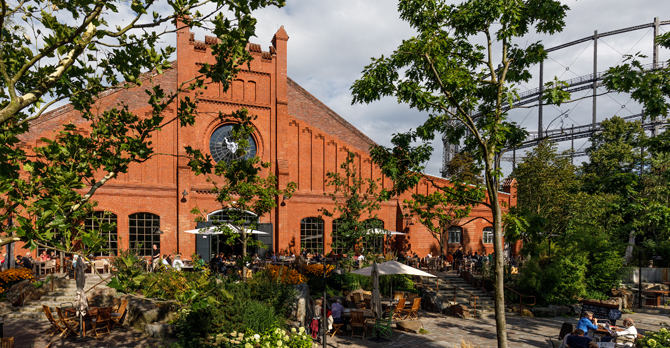
Stone Brewing’s lofty $30 million Germany brewery experiment — aimed at converting Reinheitsgebot-abiding German drinkers into American craft beer lovers — has come to an end only a few years after it began.
The San Diego-headquartered company, ranked by the Brewers Association as the ninth largest craft beer producer in the U.S., today announced the sale of its Berlin brewing facility to Scotland’s BrewDog.
Terms of the deal were not disclosed, but BrewDog will begin occupying the space on May 1.
“We invested a significant portion of a decade and significant millions building Stone Berlin. And it didn’t work out,” Stone Brewing co-founder Greg Koch wrote in a blog post. “These things hurt and these things happen. This one happened. And this one hurts a lot.”
According to a post on the BrewDog blog, the company will temporarily close the facility — which is located inside a historic 43,000 sq. ft. gasworks complex built in 1901 — and “turn the building into a BrewDog space” that is similar to its U.S. brewing headquarters in Columbus, Ohio.
As part of the acquisition, BrewDog will also pick up a like-new 100-hectoliter brewhouse, and a 10-hectoliter pilot brewing system. The purchase also includes a canning line, bottling line, taproom, and outdoor beer garden.
BrewDog plans to reopen the site later this year, but a specific timeline was not revealed.
“We want to make our new Berlin brewery the hub for the craft beer movement and use it to help elevate the status of beer and craft brewing in Germany,” the company wrote.
That’s precisely what Koch was hoping to accomplish when he announced his intention to build in Berlin back in mid-2014.
“Once open, we will bring Germany and the rest of Europe a taste of our craft beer vision, and look forward to sharing the unique beers that we have spent the last 18 years brewing,” he said at the time.
But costly construction delays ultimately proved to be a source of consternation for the brewery executive who had once been characterized as “The Beer Jesus From America” by a German tabloid.
In his blog entry, Koch placed some of the blame for his company’s failed Berlin brewery on contractors who “simply couldn’t or wouldn’t” find solutions to problems that arose during the build out.
“It cost us dearly,” he said.
“The real challenge was the tendency of our contractors to stop everything when a problem arose,” he added.

That fact was highlighted in a documentary entitled The Beer Jesus From America, which chronicled Stone’s expansion into Germany.
“Time and money just tick away,” he said of the delays. “That’s the cost of being a romantic … or a fool.”
Koch also admitted that his decision to green-light such an ambitious undertaking, rather than building a more modest brewery and taproom, was another factor that hindered the company’s chances of success.
“Ultimately the project turned out to be too big, too bold and too early in our growth curve in Europe,” he confessed.
“Maybe we should’ve started smaller, aimed for the tree line instead of the stars,” he added.
Stone, which sells beer in 26 countries, said it would continue to distribute throughout Europe.
“We have made many converts there, and we will get them good beer,” Koch wrote.
Following the announcement, various beer drinkers and bloggers took to Twitter to comment on the news.
One individual, Patrick McKee, who describes himself as a “huge sports fan, bigger beer enthusiast,” summed up Stone’s time in Berlin in the form of a popular meme that was retweeted by well-known beer writer Jeff Alworth.
Spectacular. https://t.co/QjpBR2HR7K
— Jeff Alworth (@Beervana) April 5, 2019
On his blog, Alworth took Koch to task for the brash manner in which he initially announced the Berlin project – by assembling local media to watch him drop a giant stone on a grouping of German beers.
“Koch dropped the boulder on the pile, as Stone metaphorically smashing a millennia and a half of brewing tradition,” Alworth wrote.
Shortly after the publicity stunt, Koch claimed that “Berlin is not really a beer city yet.”
And yet, arguably one of the most successful American beer entrepreneurs couldn’t make it work abroad.
Why not? Alworth argued that Koch’s attitude toward German beer culture upon entering Berlin was a misstep, and he criticized the beer executive for shifting the blame to Germans on his way out.
“It’s no surprise that the project failed given the contempt in which Stone held its new country,” Alworth wrote. “The oppositional approach that worked so well in California didn’t sell in Berlin. But instead of asking hard questions about why the brewery didn’t achieve the volume it needed, Koch blames the Germans.”
Stone Brewing declined to make Koch or other executives available for this story.
